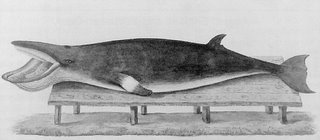blogging Deptford in 1842
 At the recent We Media conference, big media hitters continued to investigate the astonishing relentless rise of blogging. Such conferences let established media concerns comfort each other in an age where traditional journalism is under the spotlight. Though it is emerging that the BBC, Channel 4 and the Guardian are at the vanguard of the off/on-line blur. Amongst the main issues are speed and coverage, so called citizen journalists, (or just people with mobile phones and digital cameras) are catching stories and uploading photos/video/text and audio quicker because sites like Blogger, Flickr and YouTube allow quick (and easy) content hosting, tagging and comments. Then sites like Digg create flash floods of traffic, and Technorati tracks links to blog posts. In other words, blog a little and let others group content by tags and relevant links in comments.
At the recent We Media conference, big media hitters continued to investigate the astonishing relentless rise of blogging. Such conferences let established media concerns comfort each other in an age where traditional journalism is under the spotlight. Though it is emerging that the BBC, Channel 4 and the Guardian are at the vanguard of the off/on-line blur. Amongst the main issues are speed and coverage, so called citizen journalists, (or just people with mobile phones and digital cameras) are catching stories and uploading photos/video/text and audio quicker because sites like Blogger, Flickr and YouTube allow quick (and easy) content hosting, tagging and comments. Then sites like Digg create flash floods of traffic, and Technorati tracks links to blog posts. In other words, blog a little and let others group content by tags and relevant links in comments.In January 2006 a whale was stuck in the Thames and a blog immediately appeared (first entry 12.12 pm Friday) at lewiswhalewatch.blogspot.com - The web site at one stage was being looked up by journalists to research the story on the same day. This in particular shows the power of a blog consisting a mere 2 days entries - albeit many small enteries hour by hour, reviewing it today reminds us how blogging is history presented backwards, as the most recent entry appears first (in a diary or calendar it appears last) making a chronological narrative sometimes jarring. It also shows how quickly website content or commentary can reach an audience. On the same day at 6.24pm, an entry about the story was created on Wikipedia referencing the BBC website article published just 7 minutes previous.
When this sketch was done of a previous wayward whale in 1842, caught off Deptford and exhibited on a stand made especially, think how long it took the artist to produce the picture and for it to be reprinted. In contrast we can now expect that todays news events however obscure will be uploaded to Flickr, like when The Sultans Elephant ( a spectacular street theatre in central London) was covered using 'sent in photos' on the BBC London website in a well presented manner, whilst photos and videos from the 3 day event started pouring into Flickr and YouTube on Friday (the first day) with greater coverage.




0 Comments:
Post a Comment
<< Home